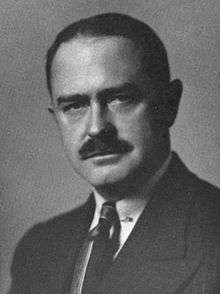Kenneth F. Simpson
Kenneth Farrand Simpson (May 4, 1895 – January 25, 1941) was a Republican member of the United States House of Representatives from New York.

Biography
Simpson was born in New York City on May 4, 1895, the son of Dr. William Kelly Simpson, a noted ear nose and throat specialist and Professor at Columbia University. He graduated from The Hill School, and his senior year was notable for his success at convincing Theodore Roosevelt to speak at the school. He graduated from Yale University in 1917, where he became a member of Phi Beta Kappa and was initiated into Skull and Bones, receiving the honor of "last man tapped."[1][2][3]
Simpson served in World War I as a member of the 302nd Field Artillery Regiment, a unit of the 76th Division, attaining the rank of captain. He later served as Commandant of the American School Detachment at the University of Aix-Marseilles.[4][5]
Simpson graduated from Harvard Law School in 1922 and became an attorney.[6] He was active in the art world of post-war France, and worked with the French government to recover works stolen by the Germans during the war. He also represented many artists and writers with whom he was friendly, including Pablo Picasso, Alexander Kerensky, Edmund Wilson, and Gertrude Stein. (Simpson's congressional campaign materials depicted him in his living room, leaning near a statue of Stein and smoking a pipe under a painting by Jean Lurçat.)[7][8]
Simpson was an Assistant United States Attorney for the Southern District of New York from 1925 to 1927, and Chairman of the New York County Republican Committee from 1935 to 1940. He was elected to represent New York on the Republican National Committee, and was a delegate to the 1936 and 1940 Republican National Conventions. Simpson was a supporter of the Fusion Republicans who fought conservatives for control of the Republican Party in New York, and he formed alliances Fiorello H. La Guardia and other liberal Republicans. Simpson was an internationalist, and an early critic of Adolf Hitler and the U.S. business interests that were seen as sympathetic to the Nazis in the 1930s.[9][10][11][12][13]
He was elected to Congress in November 1940. Simpson was sworn in on January 3, 1941. He died of a heart attack in New York City on January 25, after having served less than a month in office. Simpson was buried at Hudson City Cemetery in Hudson, New York.[14][15]
Family
In 1925 he married Helen Louise Knickerbacker Porter of Montclair, New Jersey.[16][17]
The Simpsons had four children: Dr. William Kelly Simpson, a noted Egyptologist, Yale professor, and husband of Marilyn Milton Simpson; Mrs. Helen-Louise Simpson Seggerman; Mrs. Elizabeth Carroll Simpson Bennett of Washington, D.C.; and Sally Simpson French.[18]
See also
- List of United States Congress members who died in office (1900–49)
References
- David Brady, The Association of the Bar of the City of New York, Memorial of Kenneth Farrand Simpson, Yearbook, 1941, page 521
- Syracuse Journal, Syracusan Gets Honors at Yale, May 19, 1916
- Phi Gamma Delta, The Phi Gamma Delta, March 1911, page 454
- 302nd Field Artillery Association, The 302nd Field Artillery, 1919, page 24
- Alfred E. Cornebise, Soldier-scholars: Higher Education in the AEF, 1917-1919, 1997, page 141
- Harvard University Alumni Association, Harvard Alumni Bulletin, Volume 43, Issue 14, 1941, page 834
- Yale University Library, Guide to the Kenneth Farrand Simpson Papers, May 2003
- Kenneth Simpson, LIFE Magazine, The Republican Party's Future, November 18, 1940, page 34
- Thomas Kessner, Fiorello H. La Guardia and the Making of Modern New York, 1991, page 410
- Kingston Gleaner, 5 More Sailors held in Mystery Ship Murder, August 3, 1927
- James A. Hagerty, New York Times, Republican Plank Demands That We Avoid War, June 25, 1940
- Lock Haven Express, Wary Feminism, June 13, 1936
- Albany Knickerbocker News, Gannett Group is "Satisfied" with Mrs. Weis: Delegates-at-Large for Convention Named by Unanimous Vote, February 3, 1940
- Mount Vernon (N.Y.) Daily Argus, Coudert, Barton Mentioned For Simpson's Post, January 27, 1941
- Salamanca Republican-Press, Simpson, New Congressman, Dies Suddenly, January 27, 1941
- Troy Record, Mrs. Simpson, Wife of New York Chairman, Well Known Here, September 27, 1935
- Richard Abraham, Alexander Kerensky: The First Love of the Revolution, 1990, page 359
- Brooklyn Eagle, Final Rites for Simpson Will Be Held Tomorrow, January 27, 1941
External links
- United States Congress. "Kenneth F. Simpson (id: S000433)". Biographical Directory of the United States Congress.
- Kenneth Farrand Simpson, Late a Representative from New York, U.S. Government Printing Office, 1942
| U.S. House of Representatives | ||
|---|---|---|
| Preceded by Bruce Barton |
Member of the U.S. House of Representatives from New York's 17th congressional district 1941 |
Succeeded by Joseph C. Baldwin |